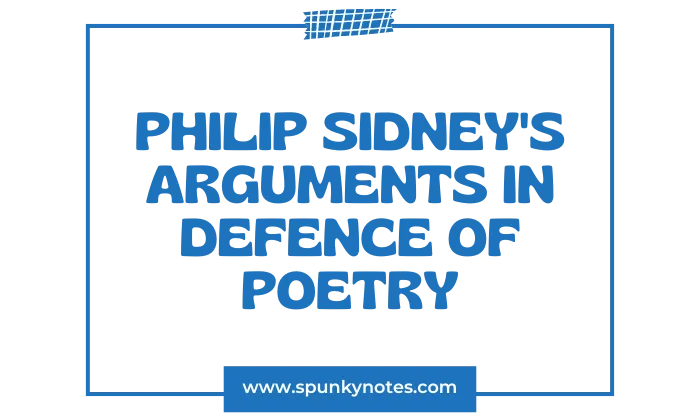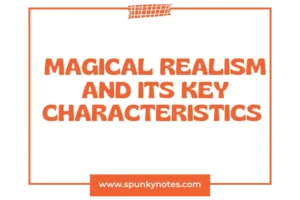

Estimated Reading Time: 8 min
Q. What are the significant allegations against poetry, and what are Sidney’s arguments in defence of poetry?
Introduction
In his Defense of Poetry, Sir Philip Sidney addresses several serious accusations against poetry and offers strong arguments to refute each one.
He believes that poetry is an important form of knowledge and education. Sidney systematically addresses the key accusations made by critics, defending poetry as a valuable and virtuous form of art.
- Poetry is a Waste of Time
- Poetry is Full of Lies
- Poetry Corrupts Morals
- Plato Banished Poetry from his Republic
- Poetry Makes Men Weak
1-Poetry is a Waste of Time
One of the most common criticisms against poetry is that people could spend their time more wisely by pursuing other, more “useful” types of knowledge.
Critics argue that reading poetry is not productive and does not lead to practical knowledge or improvement in life skills. Instead, they claim that one should focus on learning fields like science, history, or philosophy, which they consider more beneficial.
Sidney’s Argument
Sidney responds by asserting that poetry is not only a form of learning but is, in fact, one of the noblest forms of education. According to him, poetry can teach people moral values and inspire them to lead virtuous lives.
He argues that no other form of knowledge can match poetry’s ability to move people emotionally and motivate them toward good behavior. Other types of knowledge may instruct a person in what is right, but poetry has the unique ability to inspire people to act on that knowledge.
The poet…doth not only show the way but giveth so sweet a prospect into the way as will entice any man to enter into it.
For Sidney, poetry teaches virtue in a way that is more effective than other fields because it stirs both the mind and the heart. In his view, this combination of teaching and inspiring is unmatched by any other discipline, making poetry highly useful in shaping moral and ethical behavior.
2- Poetry is Full of Lies
Another major accusation against poetry is that it is built on lies and falsehoods. Critics argue that poets make things up, creating fictional stories and events that do not represent reality. Because of this, poetry is seen as misleading, encouraging people to believe in things that are not true.
Sidney’s Argument
Sidney strongly denies that poetry is deceitful or that poets are liars. He explains that poets do not claim to be telling literal truths. Instead, they present fictional stories that are meant to convey moral truths or lessons.
Sidney points out that poets, unlike historians or scientists, do not claim to describe real events or facts. Therefore, they cannot be accused of lying because they do not promise factual accuracy.
Sidney compares poets to other writers, such as historians, scientists, or doctors, who may sometimes make mistakes or give incorrect information. For example, a historian might record events inaccurately, a scientist might develop a theory that turns out to be false, or a doctor might prescribe a treatment that fails.
However, Sidney argues that poets are free from such errors because they do not claim to deliver factual reports.
The poet nothing affirmeth, and therefore never lieth.
Instead, poets present imaginative stories that aim to show what could or should happen, not what actually did happen. As a result, Sidney argues that poetry is not only harmless but also valuable for its ability to convey deeper moral lessons through fiction.
3- Poetry Corrupts Morals
The third accusation against poetry is that it corrupts people’s minds by encouraging immoral behavior. Critics argue that poetry, particularly certain genres like comedy or love poetry, fills people’s minds with inappropriate thoughts, leading them to sinful actions. For example, comedy is often seen as encouraging frivolous behavior, while love poetry may be accused of promoting lustful desires.
Sidney’s Argument
Sidney addresses this concern by acknowledging that some poetry might depict love or other human desires, but he insists that this does not mean poetry as a whole is corrupt or harmful.
He argues that the blame lies not with poetry but with individual poets who misuse their craft to promote immoral content. Just as a painter can choose to depict noble or immoral scenes, a poet can choose to write about virtuous or unworthy subjects.
Poetry lifteth the mind above the heavy and weary weight of earthly oppression.
Sidney compares poetry to other forms of art and knowledge, arguing that anything powerful, when misused, can be harmful. For example, medicine is meant to heal, but it can cause harm when misused.
Similarly, law is meant to ensure justice, but it can also be used to promote injustice. The same is true for poetry: it has the power to elevate and inspire people, but if misused, it can also have negative effects.
However, Sidney insists that it is the misuse of poetry, not poetry itself, that is to blame for any harm. He emphasizes that poetry has the potential to inspire noble thoughts and actions and should not be condemned because some poets misuse their talent.
4- Plato Banished Poetry from his Republic
The final accusation Sidney addresses is the claim that the great philosopher Plato banished poets from his ideal Republic. This is often considered one of the strongest arguments against poetry because Plato, a respected philosopher, criticized poets and their influence on society.
Critics of poetry point to Plato’s arguments to support their view that poetry has no place in a well-ordered society.
Sidney’s Argument
Sidney responds to this by suggesting that critics have misunderstood Plato’s views on poetry. He points out that Plato himself wrote in a poetic style and often used imaginative stories in his philosophical writings.
Sidney argues that Plato did not oppose poetry itself but was concerned with how poetry was being used in his time.
According to Sidney, Plato objected to how poets of his era portrayed the gods negatively, depicting them as vengeful, lustful, or filled with other vices. Plato feared that these portrayals would lead people to have false and harmful beliefs about the gods.
Sidney suggests that Plato’s objections were not aimed at poetry as an art form but at the specific content that was being presented by some poets. He argues that Plato recognized the power of poetry and that, when used properly, poetry can serve a valuable purpose in society.
Sidney goes so far as to say that Plato did not seek to banish poetry entirely but only to banish its misuse. He believes that, far from being an enemy of poetry, Plato actually saw its value and potential when used for good.
5- Poetry Makes Men Weak
The accusation is that poetry weakens men, rendering them effeminate and stripping them of their natural war-like instincts. Critics claim that engaging with poetry softens men’s character, diminishing their strength and resolve.
Sidney’s Argument
Philip Sidney argues that the allegation is born out of sheer ignorance. Those who perpetuate such ideas are as misguided as the Goths who, in their ignorance, sought to destroy the libraries of the advanced civilizations they had overthrown.
Historically, poetry has not only coexisted with the spirit of combat but has actively fueled it. Far from being a mere distraction, it has inspired countless warriors, stirring a deeper sense of purpose, valor, and determination within them.
Poetry has accompanied men into battle, serving as a source of motivation and rallying cries. Epic tales like Orlando Furioso and the legend of King Arthur resonate with soldiers on a fundamental level, sparking their imagination and fortifying their courage.
While philosophical musings might bore or alienate those with a fighting spirit, poetry speaks directly to their inner drive, aligning with their aspirations for glory and honor.
Even civilizations not typically associated with literary appreciation, like the Turks and the Tartars, found themselves captivated by the works of poets. This demonstrates the universal appeal of poetry, cutting across cultures and inspiring men to act courageously.
In ancient Greece, the words of Homer taught the people their earliest lessons in bravery. Figures like Achilles and Hector became models of heroism for generations to come.
So much so that even Alexander the Great, one of the most renowned military leaders in history, found greater inspiration in the verses of Homer than in the teachings of Aristotle, one of the greatest philosophers of all time.
In essence, poetry does not weaken or feminize men. Instead, it awakens their latent war-like instincts, channeling them toward greater deeds of valor and fortitude. Rather than undermining the spirit of combat, poetry nurtures and amplifies it, standing as a timeless companion to the warrior’s heart.
Conclusion
In his Defense of Poetry, Sidney refutes the major accusations made against poetry and presents a strong case for its value and importance. He argues that poetry is not a waste of time but a powerful tool for teaching virtue and inspiring moral action.
He rejects the claim that poetry is based on lies, explaining that poets do not claim to present factual truths but instead offer imaginative stories that convey deeper lessons.
Throughout his defense, Sidney emphasizes the unique ability of poetry to inspire, educate, and elevate the human spirit. He believes that poetry when used properly, plays an essential role in shaping a virtuous and ethical society.


